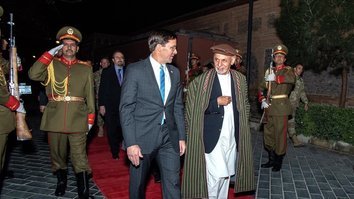BRUSSELS -- The United States has secured a seven-day reduction in violence in talks to help seek a negotiated settlement in Afghanistan, US Defence Secretary Mark Esper said Thursday (February 13).
The announcement came as NATO defence ministers met in Brussels and a day after President Ashraf Ghani reported "notable progress" in negotiations with the militants.
"The United States and the Taliban have negotiated a proposal for a seven-day reduction in violence," Esper told reporters, dubbing his meetings with NATO colleagues "productive."
"We've said all along that the best, if not the only, solution in Afghanistan is a political agreement. Progress has been made on that front, and we'll have more to report on that soon, I hope," he said.
Esper did not say when the partial truce would begin, but on Wednesday (February 12) a Taliban official told AFP that the group would begin a "reduction of violence" on Friday (February 14).
"It is our view that seven days for now is sufficient, but in all things our approach to this process will be conditions based, said Esper. "I will say it again: conditions based."
"So it will be a continual evaluative process as we move forward, if we go forward."
A possible breakthrough
Washington and the insurgents have been locked in talks that have stretched over more than a year.
The two foes have been on the brink of a breakthrough before, with a deal all but complete in September before the US government nixed it at the last moment amid continued Taliban violence.
Citing Afghan and US officials, the New York Times has reported that Washington had given conditional approval to a deal with the Taliban that would call for the United States to begin withdrawing troops.
For all intents and purposes, this will be a ceasefire but cannot be named that because of various "complications", said a Taliban source in Pakistan cited by the Times.
The only other time there has been a Taliban ceasefire since the 2001 United States-led invasion was in 2018, during the first three days of Eid at the end of the holy month of Ramadan.
It invoked moving scenes such as Afghans sharing ice cream with Taliban fighters and snapping selfies with locals. But afterwards, the violence resumed.
Despite talks between the United States and the Taliban, Afghanistan's war has raged on, with the number of clashes jumping to record levels in the last quarter of 2019, according to a recent US government watchdog report.

![US Defence Secretary Mark Esper (left) greets acting Afghan Defence Minister Asadullah Khalid prior to a meeting at the NATO headquarters in Brussels on February 13. [Virginia Mayo/AFP]](/cnmi_st/images/2020/02/13/22463-000_1oy9a8-585_329.jpg)







I am not that much optimistic for peace to come in Afghanistan, because America will never want an independent regime or government system in Afghanistan. They want a puppet government in Afghanistan. And Taliban don’t want to be under influence of America.
Reply2 Comment
Ghani is the main factor for peace hindering in Afghanistan. He will never turn in power to the Taliban. Taliban will also never surrender to the Afghan government, because they have fought for 20 year against the invasion or colonialism and the puppet government of America; therefore, if Taliban's leaders make peace like the peace which Hikmatyar made, still the peace will not come, and their military fighters will continue their fighting. If we turn in the complete power to Taliban, still peace will not come, because there are some people who are against the Taliban and their ideologies. If Taliban will ignore 50% of their demands and the same does the government, then it is possible that a permanent peace will come to the country.
Reply2 Comment